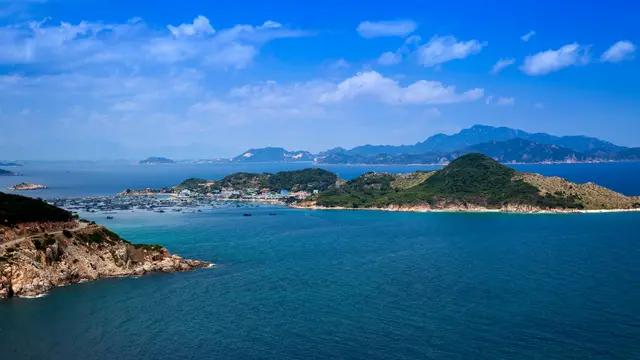
South China Sea. /Getty
Editor's note: Hamzah Rifaat Hussain is a former visiting fellow at the Stimson Center in Washington and serves as assistant researcher at the Islamabad Policy Research Institute (IPRI) in Pakistan. The article reflects the author's opinions and not necessarily the views of CGTN.
Since the revision of the Maritime Traffic Safety Law (MTSL)adopted by a session of the Standing Committee of China's National People's Congress(NPC)on April 29, media coverage on its application, contours and elements has been largely lopsided and inaccurate. Akin to earlier arguments presented against the Coast Guard Law as provoking maritime tensions in the South China Sea, the MTSL is labeled as an attempt by Beijing to assert its claims in the seas and fire at foreign vessels at will. Such frail arguments expose a simple fact that once again China's policies in the region have been misconstrued and misrepresented.
It is perhaps worthwhile to acknowledge the fact that the amended MTSL hinges on improving maritime conditions and security. Yet Nikkei Asia and the Japan Times presented this amendment as an attempt to flex muscles in the Indo-Pacific with ensuing commentary centering on how such amendments follow legislation which took effect in February, allowing China's coast guard to fire at foreign ships.
The conspiracy theories surrounding the Coast Guard Law have already been debunked and challenged by referencing clauses which stipulate three conditions of counterterrorism, dissuasion of attacks against law enforcement vessels and handling violent incidents at sea having to be met as prerequisites prior to application. Despite this, the amended MTSL is presented as an aggressive tactic or an expansionist maneuver, which is nothing but a distortion of facts.
The truth is that the NPC Standing Committee voted in favor of an amendment which focuses on controlling marine epidemics. Contrary to the narratives being presented, the revision of the law states that captains of vessels venturing into territorial waters will bear responsibility for implementing emergency measures if a crew member is suspected of carrying a life threatening infectious disease.
The revision further states that all relevant personnel will be quarantined with mandatory reporting to the authorities. This maritime policing is a preventive measure to thwart threats of COVID-19 transmission over the seas which begs the questions: Why are alarm bells being raised over the MTSL? And can such preventive measures be equated with acts of aggression?

A Chinese marine surveillance vessel near the Diaoyu Islands in the East China Sea, September 24, 2012. /VCG
The answer is no. Legitimate policing cannot be equated with flexing muscles given that the policy adopted is to hold foreign ships which are hazardous to maritime safety accountable and having them report prior to sailing in Chinese waters. Such measures strengthen Indo-Pacific tranquility instead of jeopardizing it, yet speculation is rife with Japan being at the forefront by raising alarm bells with reference to the Diaoyu Islands.
The speculations have centered on China exercising its authority over "jurisdictional waters," with scant understanding paid to how jurisdictional waters, as defined in the MTSL, are broader than territorial waters or contiguous zones. Yet this has not prevented lobbyists from misrepresenting Chinese maneuvers with even the Maritime Safety Administration building large patrol vessels being previously presented as alarmist and imperiling peace and tranquility in the Indo-Pacific.
It has been reiterated time and time again that American militarization of the South China Sea poses a direct threat to Beijing and imperils peace in the region. However, threat perceptions continue to be disproportionately directed towards China, with any legislation or policy overture sanctioned by Beijing viewed as an act of aggression.
While coverage continues to center on Beijing sending vessels around the Diaoyu Islands, there is no consideration of other variables which have an impact on regional balance and deterrence. Now, as preventive measures through the revised MTSL are in place which deal with maritime epidemics, China's potential for escalating tensions in the Indo-Pacific is being constantly highlighted by the sources cited while coming up with bizarre claims which are equally contentious.
The undeniable fact is that the MTSL is being implemented in the context of the pandemic, with an aim to increase transparency of foreign vessels in Chinese waters which are potentially hazardous. This is a welcoming sign given that preventing the unwarranted consequences of pandemics over the seas instead of imperiling peace and security in the Indo-Pacific, as erroneously stated, is what the MTSL is all about.
(If you want to contribute and have specific expertise, please contact us at [email protected])
 简体中文
简体中文

